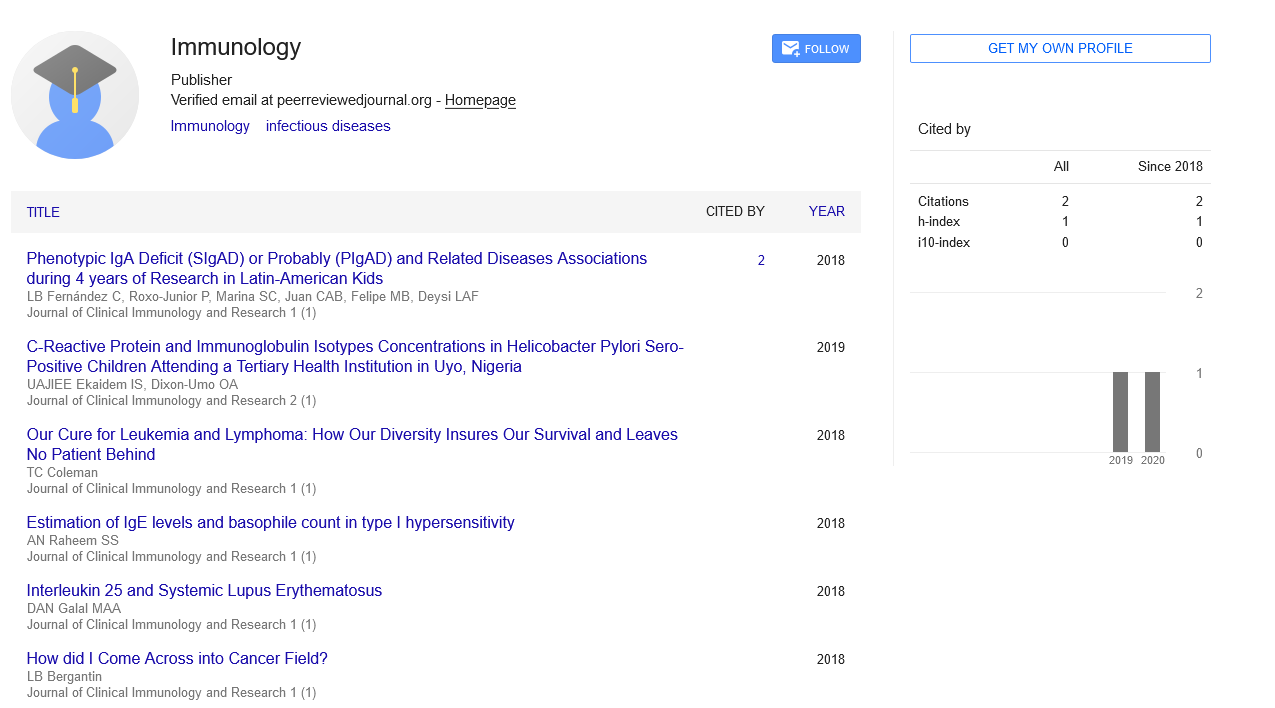Perspective, J Clin Immunol Res Vol: 8 Issue: 1
Immunotherapy in Allergic Diseases: From Theory to Practice
Min Muquan*
Department of Pediatrics, West China Second University Hospital, Sichuan University, Chengdu, China
*Corresponding Author:Min Muquan
Department of Pediatrics, West China Second University Hospital, Sichuan University, Chengdu, China
E-mail:Muquan2005@163.com
Received date: 27 December, 2023, Manuscript No. JCIR-23-123721;
Editor assigned date: 29 December, 2023, PreQC No. JCIR-23-123721 (PQ);
Reviewed date: 12 January, 2024, QC No. JCIR-23-123721;
Revised date: 19 February, 2025, Manuscript No. JCIR-23-123721 (R);
Published date: 26 February, 2025, DOI: 10.4172/JCIR.1000099
Citation: Robles A (2025) Muquan M (2025) Immunotherapy in Allergic Diseases: From Theory to Practice. J Clin Immunol Res 8:1.
Abstract
Immunotherapy has emerged as a transformative approach in the management of allergic diseases, providing a targeted and disease-modifying strategy for individuals suffering from allergies. This manuscript reviews the theoretical foundations, mechanisms of action, and practical applications of immunotherapy in allergic diseases. From an exploration of allergic sensitization to the latest advancements in allergenspecific immunotherapy, the review aims to provide a comprehensive understanding of the evolving landscape in the field and its implications for clinical practice.
Keywords: Immunotherapy; Allergic diseases; Allergic; Milestones
Introduction
Allergic diseases: A growing public health concern allergic diseases, including allergic rhinitis, asthma, and atopic dermatitis, have seen a significant increase in prevalence globally. The manuscript discusses the burden of allergic diseases and the need for effective, long-term management strategies.
Evolution of immunotherapy: The history of immunotherapy for allergic diseases is traced from its conceptualization to modern-day applications. The manuscript highlights key milestones in the development of allergen-specific immunotherapy.
Description
Theoretical foundations of allergic sensitization
Allergen recognition and sensitization: The manuscript delves into the mechanisms underlying allergic sensitization, including the recognition of allergens by the immune system, the role of dendritic cells, and the generation of allergic responses.
Immunologic basis of allergic diseases: The review explores the immunologic basis of allergic diseases, emphasizing the dysregulation of Th2 responses, IgE-mediated reactions, and the involvement of mast cells and eosinophils in allergic inflammation.
Principles of immunotherapy
Allergen-Specific Immunotherapy (AIT): The cornerstone of immunotherapy for allergic diseases is Allergen-Specific Immunotherapy (AIT). The manuscript discusses the principles of AIT, including the administration of allergens to induce immune tolerance and modify the allergic response.
Mechanisms of action: The immunological mechanisms underlying AIT are explored, including the induction of regulatory T cells, modulation of B cell responses, and shifts in the balance of Th1 and Th2 immune responses.
Practical applications of immunotherapy
Subcutaneous Immunotherapy (SCIT): Subcutaneous immunotherapy, the traditional route of administration, involves the subcutaneous injection of allergens. The manuscript reviews the clinical efficacy, safety considerations, and patient selection for SCIT.
Sublingual Immunotherapy (SLIT): Sublingual immunotherapy, an alternative to SCIT, involves the administration of allergens under the tongue. The manuscript discusses the practical aspects, effectiveness, and safety profile of SLIT.
Novel approaches Epicutaneous Immunotherapy (EPIT) and olfactory immunotherapy: Emerging modalities, including Epicutaneous Immunotherapy (EPIT) and olfactory immunotherapy, are explored. The manuscript discusses their mechanisms, current status in research, and potential applications.
Immunotherapy in allergic rhinitis
Clinical efficacy: The manuscript reviews the clinical efficacy of immunotherapy in allergic rhinitis, including symptom reduction, improvement in quality of life, and the prevention of disease progression.
Long-term effects: Long-term effects of immunotherapy, such as sustained benefits after treatment cessation and the potential for disease modification, are discussed. The review also addresses factors influencing treatment outcomes.
Immunotherapy in asthma
Impact on asthma control: Immunotherapy's role in the management of asthma, including its impact on symptom control, reduction in medication use, and improvement in lung function, is explored.
Prevention of asthma progression: The manuscript discusses the potential of immunotherapy to prevent the progression of allergic rhinitis to asthma and its impact on the natural history of asthma.
Immunotherapy in atopic dermatitis
Modulation of the atopic march: The manuscript explores the role of immunotherapy in modulating the atopic march, the progression of allergic diseases from childhood atopic dermatitis to asthma and allergic rhinitis.
Efficacy and safety in atopic dermatitis: The review examines the evidence regarding the efficacy and safety of immunotherapy in the management of atopic dermatitis, including improvements in skin symptoms and quality of life.
Advances in allergen-specific immunotherapy
Component-resolved diagnostics: Advancements in componentresolved diagnostics allow for a more precise identification of allergenic components. The manuscript discusses the implications of personalized immunotherapy based on component-resolved diagnostics.
Adjuvants and novel formulations: The review explores the use of adjuvants and novel formulations to enhance the efficacy and safety of immunotherapy, including the development of modified allergens and the use of adjuvants to optimize immune responses.
Challenges and considerations
Patient selection and adherence: Challenges related to patient selection, adherence to treatment regimens, and the identification of individuals who stand to benefit most from immunotherapy are discussed.
Safety considerations: The manuscript addresses safety considerations associated with immunotherapy, including the risk of systemic reactions, the role of dose escalation, and the safety of longterm treatment.
Future directions and conclusion
Personalized immunotherapy: The manuscript explores the potential for personalized immunotherapy, incorporating patientspecific factors, including genetic and environmental considerations, to optimize treatment outcomes.
Innovative approaches: The review concludes with a discussion of innovative approaches on the horizon, such as the use of biologics and gene therapy in the field of immunotherapy for allergic diseases.
 Spanish
Spanish  Chinese
Chinese  Russian
Russian  German
German  French
French  Japanese
Japanese  Portuguese
Portuguese  Hindi
Hindi 